The positive sales figures in aids to daily living (ADL) products are fueled by a potent mix of demand and seemingly never-ending complications to the reimbursement realms of private insurance and Medicare. “Competitive bidding has pushed people into having to look elsewhere,” says Jo-Ann Tilghman, president and founder of Granny Jo Products, which is based in Lakeland, Fla. “Providers must make up the difference somewhere else. They are increasing their retail offerings because they must if they want to survive.”
The much-hyped Baby Boom Generation, still in its relative infancy, is indeed fueling demand. While some Boomers do need ADL products, others are diligently acting as caregivers for elderly parents. These Boomers are looking for products, but the search is still not all that easy.
Why the difficulty? Tilghman maintains that despite the undeniably favorable demographics, the ADL market is drastically overlooked. “You have Babies R’ Us, Toys R’ Us, and Kids R’ Us, but no large senior retailer,” she muses. “Look at Target, J.C. Penney, or Macy’s—no one has a designated senior area. They are missing a huge opportunity and leaving it to the HME/DME people.”
Growth Opportunity
Claiming the market before the “big guys” figure it out is something that a growing number of home-care providers are valiantly attempting to do. One such retailer is Martha Hansen, owner of YOUCAN TOOCAN, a 3,800 square-foot store in Denver that is completely devoted to retail cash sales.
In business since 1994, Hansen has meticulously built a reliable base of word-of-mouth referrals. Most of those positive recommendations are due to knowledgeable one-on-one encounters with customer service. “The big boxes are a concern to us,” admits Hansen, who devotes 3,650 square feet out of 3,800 in total to showroom space. “If people are just looking for price, we can’t compete. But we have professional sales staff—OTs, PTs, low vision and hearing specialists, and social workers who are aging specialists. They are here to help people decide and show them the various options. We also service the products if they need repair.”
Some customers come in, benefit from staff expertise, then go elsewhere or look online for cheaper deals. It happens, but not enough to dent sales, which continue to go up every year. Regular customers have helped to fuel that annual growth, but every business needs new customers. Hansen has been able to find that market by sending out a paper catalog to people who request it. “We don’t do a mass mailing,” she says. “We distribute once a year to the retirement communities we have worked with, rehab centers, nursing homes, physician offices and home health care providers. We also go to senior centers and senior case managers.”
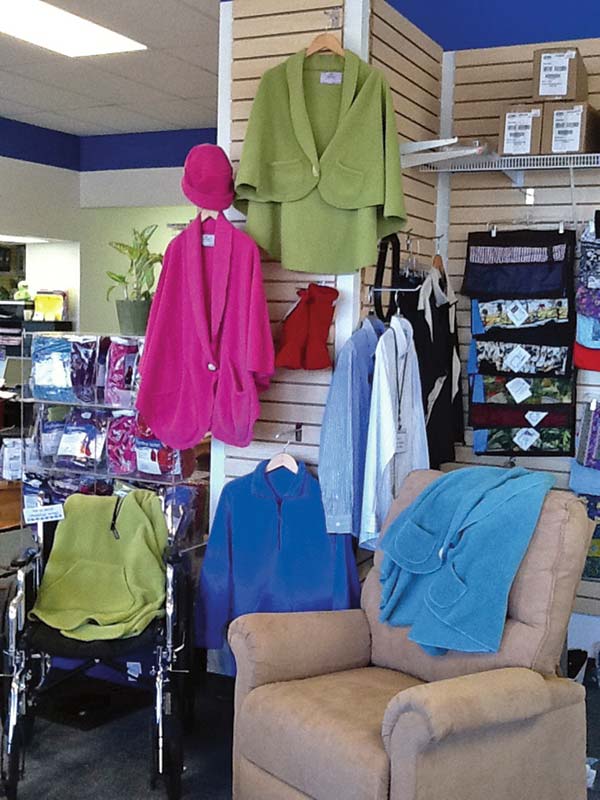 With a colorful toucan bird serving as the company logo, the store is a vibrant and inviting environment for patients and caregivers who are often in the midst of difficult times. Helping customers through these times by offering real solutions to everyday problems is made a little easier because YOUCAN TOOCAN employees are not spending valuable time chasing down reimbursement.
With a colorful toucan bird serving as the company logo, the store is a vibrant and inviting environment for patients and caregivers who are often in the midst of difficult times. Helping customers through these times by offering real solutions to everyday problems is made a little easier because YOUCAN TOOCAN employees are not spending valuable time chasing down reimbursement.
“We gave up our Medicare number about five years ago,” Hansen explains. “It was mostly because of requirements such as accreditation, which was an expensive proposition. I figured we would be looking at $10,000, and for the few products we sell that would be covered by Medicare, it would not be worth it. We sell more lift chairs and walkers now than we ever did when we were using Medicare. We also did not want to be a part of competitive bidding. We do give customers forms that they can use to file on their own with Medicare.”
The three best sellers at YOUCAN TOOCAN are a sock aid, walker skis (designed to take the place of tennis balls or rubber tips) and reachers. Customers can choose among many prices and styles for all of these products.
Jan Erickson, president/owner, Janska, a manufacturer based in Colorado Springs, Colo., believes a bit of style can motivate patients who are looking for items that transcend the medical look. “Very strong” sales over the last three years have validated her theory, and she intends to continue down this road as she seeks to capitalize on market demand.
“As we took our designs to the market, we thought we would get into hospital gift shops and DMEs, but mainstream boutiques also started buying from us because they loved the simple, elegant style of our clothing,” says Erickson. “Eventually we divided the company into two departments, the Janska clothing that is more mainstream and the Wellness Wear, which is more in the HME/DME category.”
Born of Necessity
Erickson and Tilghman are friendly competitors in the growing ADL world, but the similarities do not stop there. Both women set out to fill specific needs of friends and/or loved ones by designing innovative products.
In Erickson’s case, the company’s first product began as a dream back in 2002. “After a friend of mine had experienced a stroke, I dreamt about a jacket she could put on more easily,” she says. “I got up in the middle of the night and sketched it. The jacket would be colorful, stylish and would keep her warm. Now that jacket provides physical comfort and even emotional contentment for various people at difficult times in their lives.”
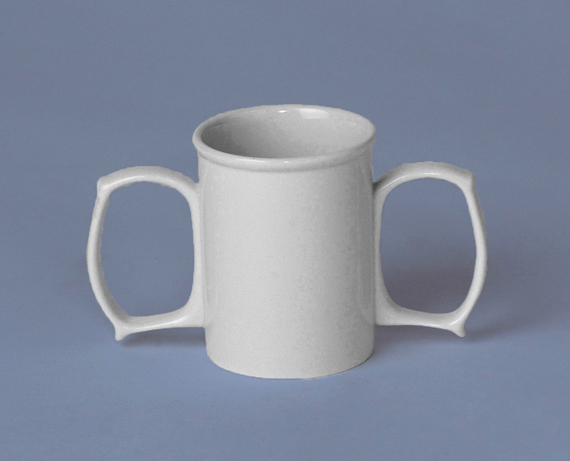 Tilghman found inspiration from her mother-in-law, who had developed Alzheimer’s disease. “She was struggling with dexterity and had to pick up her morning mug like a young child,” she recalls. “I thought I would go online and find a mug with two handles and be all set. I was shocked that I couldn’t find one that wasn’t plastic. I said, ‘She can’t be the only one who needs this.’ My son was vice president of a textile company, and he knew some people who could make this mug, which we now call the Dignity Mug. The next thing I know we are in business.
Tilghman found inspiration from her mother-in-law, who had developed Alzheimer’s disease. “She was struggling with dexterity and had to pick up her morning mug like a young child,” she recalls. “I thought I would go online and find a mug with two handles and be all set. I was shocked that I couldn’t find one that wasn’t plastic. I said, ‘She can’t be the only one who needs this.’ My son was vice president of a textile company, and he knew some people who could make this mug, which we now call the Dignity Mug. The next thing I know we are in business.
“We also developed a lap blanket called the Texture Lap Robe that has three different textures for people who like to stroke,” adds Tilghman. “It has a little fringe that you can twirl with your fingers and keep your hands occupied, because that is something that a lot of Alzheimer’s and dementia patients take comfort from. That is our newest product.”
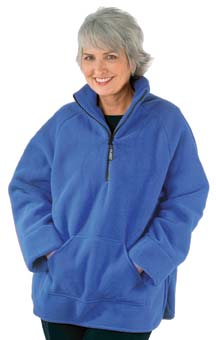 When choosing a fabric, Erickson ultimately decided on recycled Polartec fleece, all milled and sewn in the United States. “It is lightweight, breathable and wicks away moisture,” she says. “It has vibrant colors that stay looking good. The lightweight warmth is why we selected Polartec as our main fabric. People also like American-made products, even though it means they pay a little more.”
When choosing a fabric, Erickson ultimately decided on recycled Polartec fleece, all milled and sewn in the United States. “It is lightweight, breathable and wicks away moisture,” she says. “It has vibrant colors that stay looking good. The lightweight warmth is why we selected Polartec as our main fabric. People also like American-made products, even though it means they pay a little more.”
“Janska makes a lap shawl called the LapWrap that is good for older people while they are reading or watching television,” says Hansen. “We make an easy wear jacket for people with difficulty lifting their arms. We sell capes that are easy for our customers to get on. We sell MocSocks with tread on the bottom—those are all big sellers for us.”
Commitment to Style
Both Granny Jo Products and Janska are committed to function and style, and are not content to merely offer products that fill a medical need. “We are offering things that are more fashionable and not as utilitarian,” Tilghman explains. “There is not a lot of fashion merchandise and accessory merchandise in this market. My mother would never in a million years have used a black nylon walker bag on her walker when she had her hips replaced. She did not want something that screamed, ‘You’re old, you’re sick, you’re infirm!’ She wanted something with some style and some fashion sense, and there are a lot of people out there who feel the same way.”
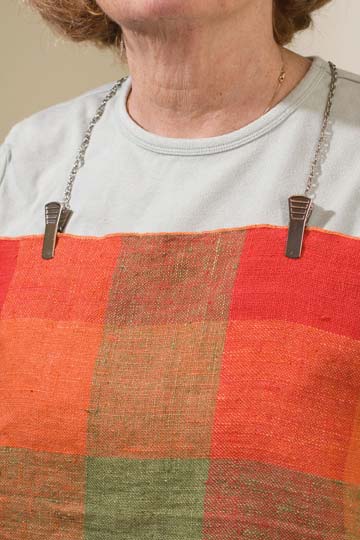 Even an item like a napkin clip can have a measure of style, and Tilghman points to robust sales for these items as proof of the demand for attention to design, even for small items. “We get letters from people who say they are much more comfortable wearing our napkin clips than a bib—a bib is demeaning,” she says. “We have sold napkin clips far beyond our wildest dreams. They’re similar to the ones at a dentist office, but they have a much larger clip that is senior-friendly. We have six different styles now, with silver chains, black lanyards, fake pearls, beads and braids.”
Even an item like a napkin clip can have a measure of style, and Tilghman points to robust sales for these items as proof of the demand for attention to design, even for small items. “We get letters from people who say they are much more comfortable wearing our napkin clips than a bib—a bib is demeaning,” she says. “We have sold napkin clips far beyond our wildest dreams. They’re similar to the ones at a dentist office, but they have a much larger clip that is senior-friendly. We have six different styles now, with silver chains, black lanyards, fake pearls, beads and braids.”
Assortment of Aids
Perhaps less glamorous, but equally important, are the types of ADLs that help one perform the most basic daily tasks. Carex, for instance, offers everything from a selection of reachers (26-32 inches) to doorknob grippers and lamp-switch turners. Other helpful and commonsense items include a cane holder, a jar opener, easy key turners, shopping bag carriers, a magni-reader and magnifying glass, pen and pencil cushions, adhesive-backed safety treads and spoon and fork holders. Dressing aids include a dressing stick, a long-handled shoehorn and a zipper and button puller.
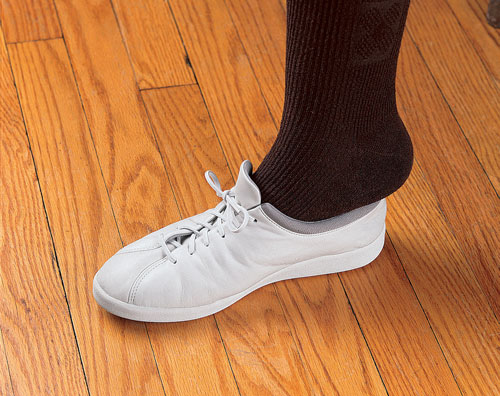 Maddak carries similar devices to assist with dressing unassisted, along with Velcro shoe fasteners and sock and stocking aids. Its lineup of ingenious reacher designs includes a pediatric model and a handy clip for wheelchair or rollator attachment. Swiveling back scrubbers and lotion applicators provide access to those “hard to reach” spots. Dining aids include scooper plates with suction-cup bases, thick-handled eating utensils, and high-walled inner lip plates. Book holders keep pages in place while reading, and adaptive writing instruments assist those with limited hand/finger dexterity to grasp pens and pencils while writing longhand. In addition to bedroom safety items such as overhead trapeze lifts and single- and double-sided bedrails, Nova provides devices such as an oxygen cart with wheels and a digital exercise pedaler for increasing strength and improving coordination.
Maddak carries similar devices to assist with dressing unassisted, along with Velcro shoe fasteners and sock and stocking aids. Its lineup of ingenious reacher designs includes a pediatric model and a handy clip for wheelchair or rollator attachment. Swiveling back scrubbers and lotion applicators provide access to those “hard to reach” spots. Dining aids include scooper plates with suction-cup bases, thick-handled eating utensils, and high-walled inner lip plates. Book holders keep pages in place while reading, and adaptive writing instruments assist those with limited hand/finger dexterity to grasp pens and pencils while writing longhand. In addition to bedroom safety items such as overhead trapeze lifts and single- and double-sided bedrails, Nova provides devices such as an oxygen cart with wheels and a digital exercise pedaler for increasing strength and improving coordination.
As familiar as these products may be to HME/DME providers, they can be a revelation to customers who haven’t already discovered them or who have developed new physical conditions calling for additional assistance in their lives. And stocking these types of low-cost, good-sense items will help endear you to those relying on you to enhance their daily experience.




